Listen:
Scroll down for a transcript, video, how to subscribe, and more
Episode Synopsis:
Welcome to Episode #75 of Habitual Excellence, presented by Value Capture.
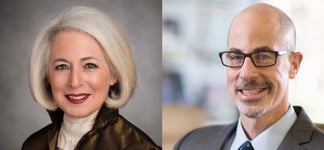 Joining us today are Karen Wolk Feinstein, Ph.D., President and CEO of the Pittsburgh Regional Health Initiative, along with Ken Segel, CEO of Value Capture.
Joining us today are Karen Wolk Feinstein, Ph.D., President and CEO of the Pittsburgh Regional Health Initiative, along with Ken Segel, CEO of Value Capture.
It's a preview of the live panel discussion webinar that will be taking place on January 25, 2023, at 1 pm ET.
Why Does the U.S. Need a National Patient Safety Board?
In today's episode, Karen and Ken talk with host Mark Graban about topics and questions, including:
- Introductions: their roles and backgrounds
- Why patient safety and this National Patient Safety Board proposal mean so much to them.
Click to visit the main Habitual Excellence podcast page.
Episode Video:
Quotes:
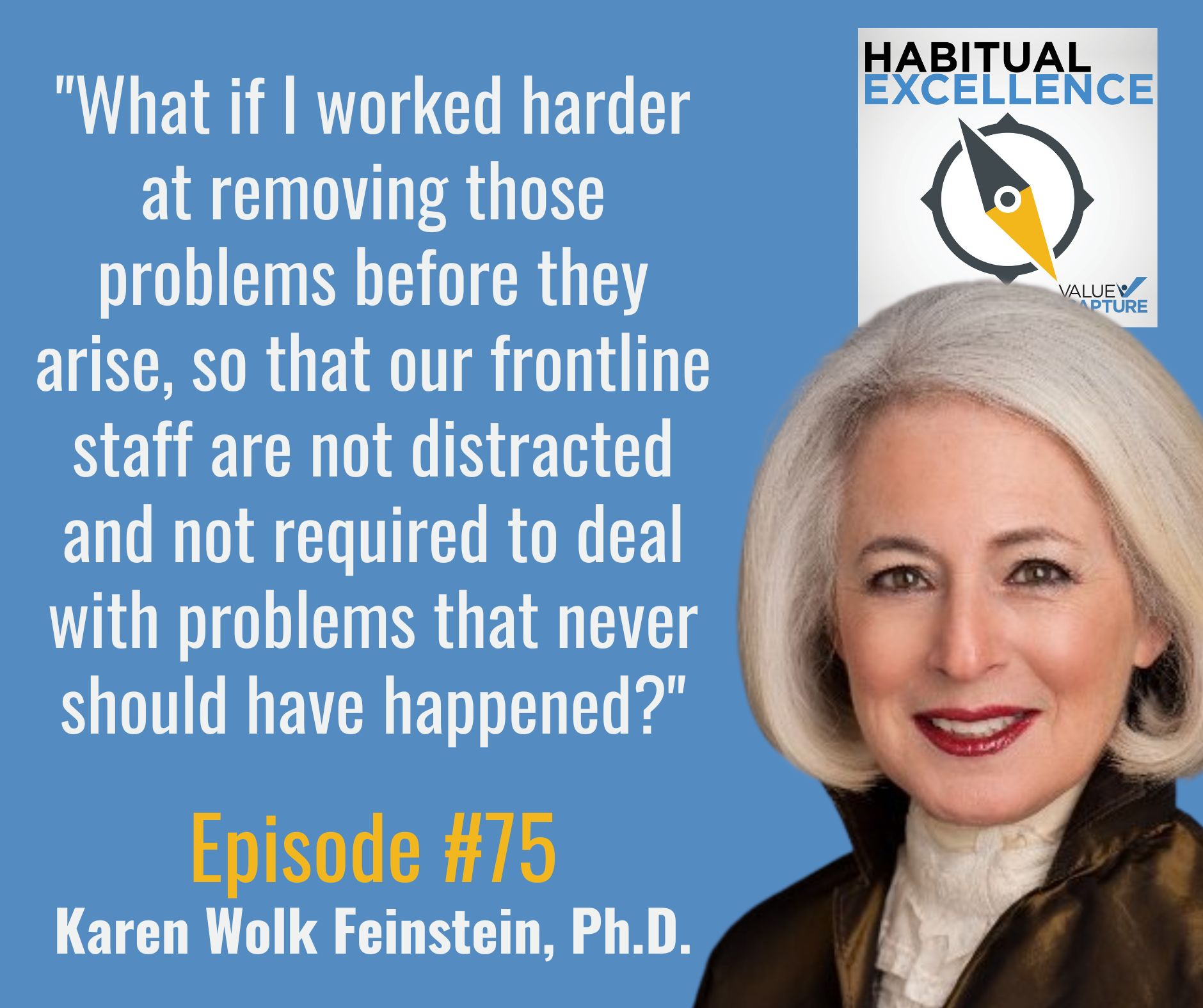
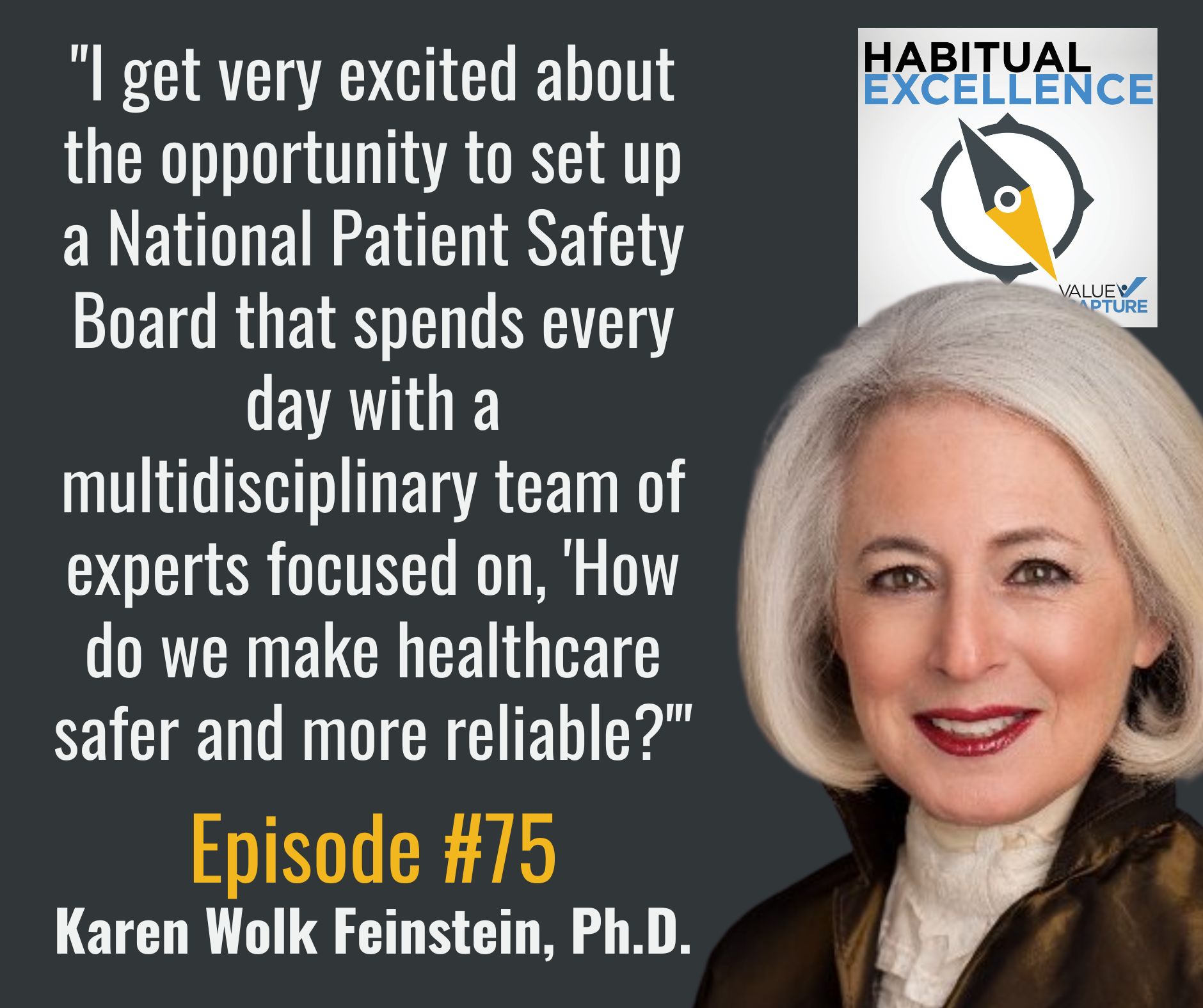
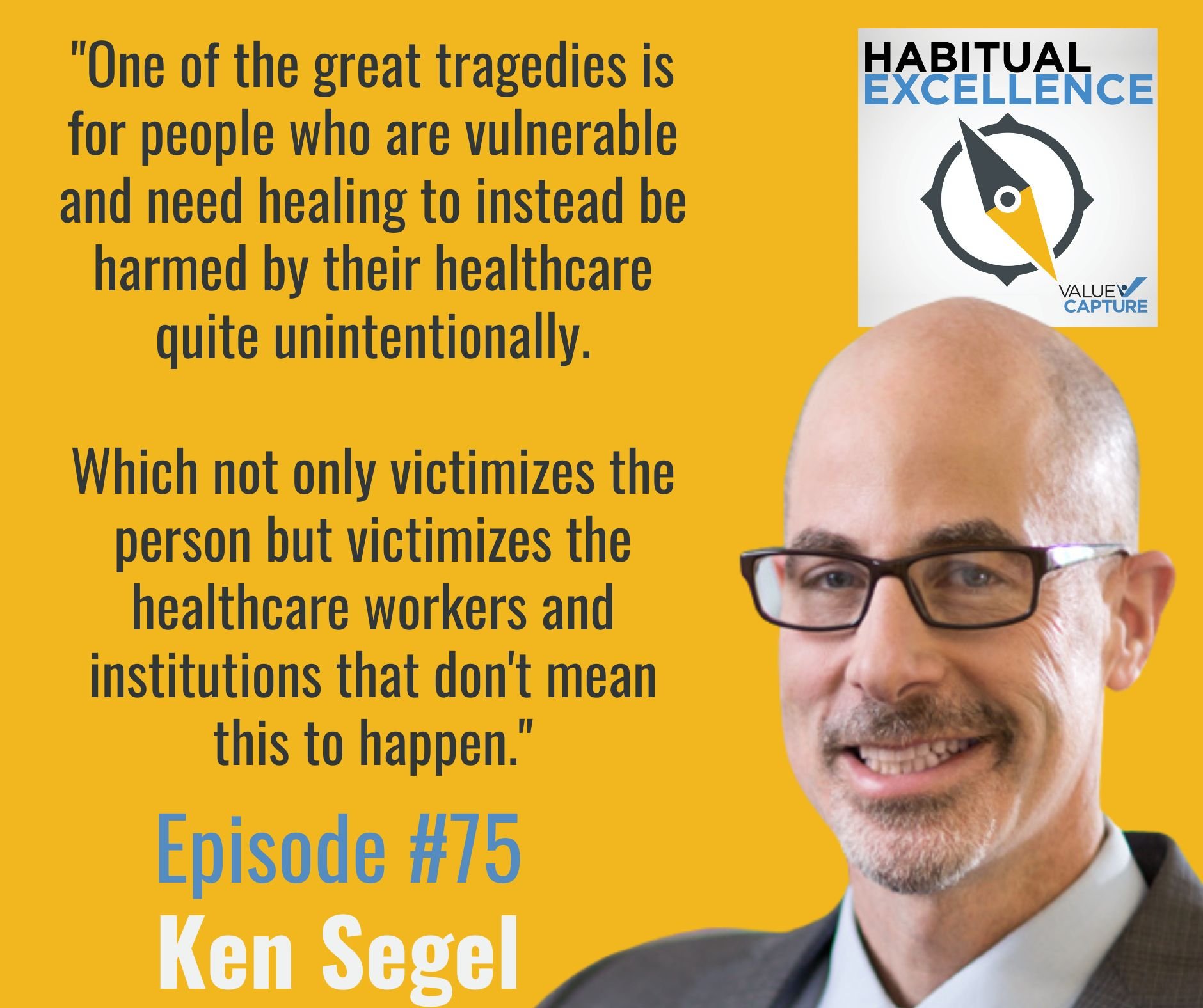
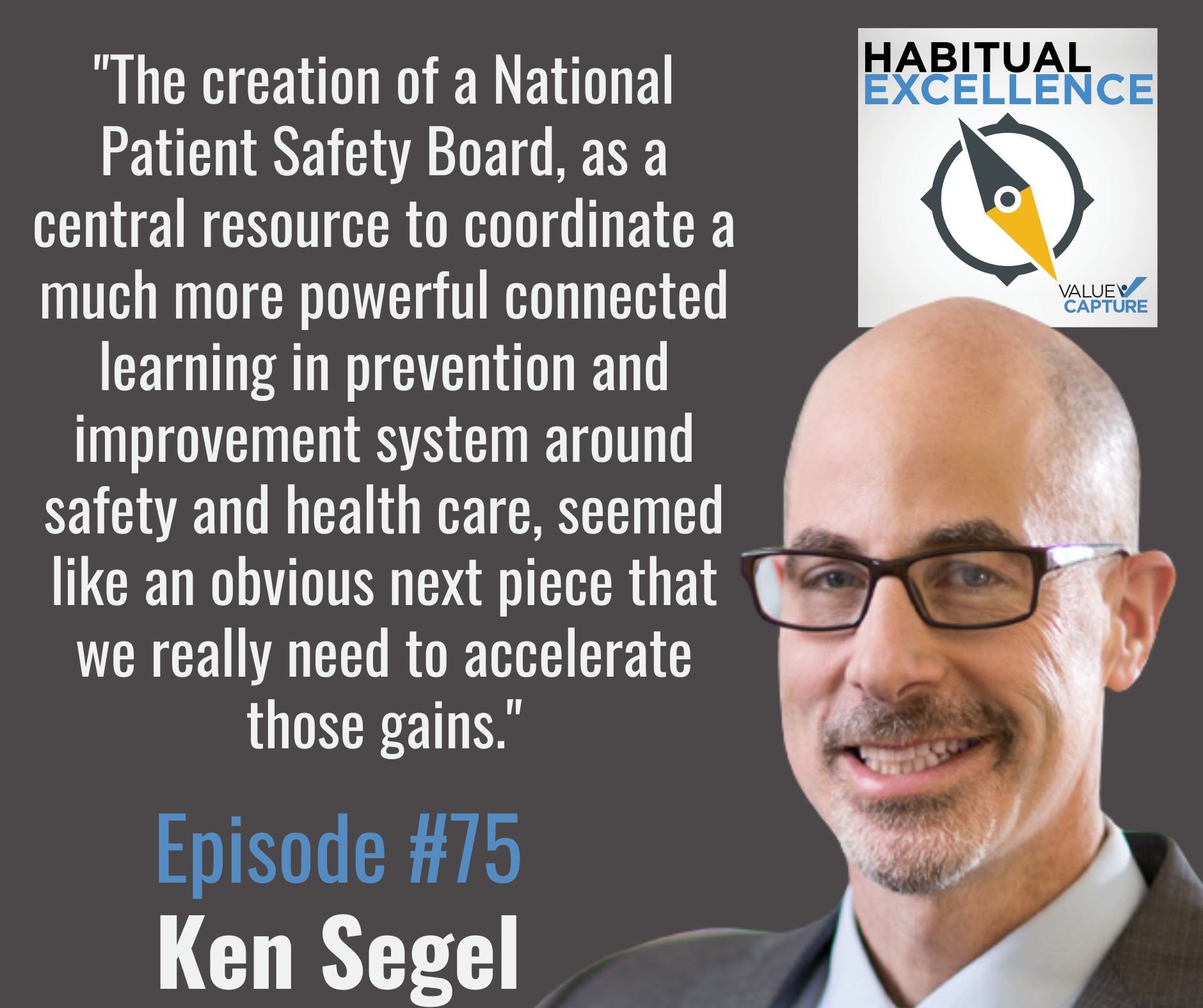
Subscribe:
To make sure you don't miss an episode, be sure to subscribe today! Please rate and review the podcast.
Transcript:
Mark Graban: Hi, I'm Mark Graban from Value Capture. Today, we're doing a quick preview of a live panel discussion webinar titled "Why Does the US Need a National Patient Safety Board?" That's going to take place on January 25th at one o'clock Eastern.
Today, we're going to hear a little bit from the two panelists. They are Dr. Karen Wolk Feinstein and Ken Segel. To register for this event, go to www.valuecapturellc.com/webinars, or you can look for a link in the show notes.
If you're able to join us live on the 25th, you can submit questions you can be part of what's going to be a lively and informative discussion. If you're not able to attend live, register anyway, and we'll send you a link to the recording on this really important topic and concept, the National Patient Safety Board.
Next, we'll be joined by Dr. Karen Wolk Feinstein. Karen, thank you for joining us. How are you?
Karen Wolk Feinstein: I'm good, and you?
Mark: I'm doing well. I'm excited. I'm looking forward to the discussion on the 25th. Maybe, I can ask you, in your own words, to tell us about who you are.
Karen: I am the president CEO of the Jewish Healthcare Foundation here in Pittsburgh. About 25 years ago, we established a supporting organization called the Pittsburgh Regional Health Initiative, which is a regional safety and quality collaborative of the major stakeholders in healthcare.
Mark: You've been working on this concept and this proposal and now the bill around the National Patient Safety Board. We'll hear more about this on the 25th, but I'd love to hear your thoughts on why this is such an important concept for you.
Karen: As I mentioned, it's been 25 years since we founded a regional collaborative to make healthcare safer and to remove many of the harms in healthcare that kill so many thousands of people. Some would say as many as 250,000 people a year, but they're adverse events that are preventable, and that makes it particularly sad.
Many people go to healthcare settings to be healed and not hurt. We have tried many interventions so over the years, but a lot of them put a lot of stress on the frontline. They asked the frontline to do more than their basic clinical duties. They asked the frontline to sometimes interrupt their daily workflow to deal with problems as they arise.
As time went on, I started to say to myself, "What if I worked harder at removing those problems before they arise, so that our frontline staff are not distracted and not required to deal with problems that never should have happened?"
I think of other industries where so much safety as autonomous, where technology's been deployed to put rovers and robots on Mars. Opportunity walked around Mars but for over a year. Yeah, I know we can't get people out of outpatient surgery often without an infection or a knife slip or something that went wrong that shouldn't have.
Some things will be harder to prevent than others, but we could at least start scaling back all the ways in which equipment fails us, or our alarm and alert system doesn't work, or we have on the floor, some poor designs of the whole care process that should have been fixed a long time ago.
When I think of the opportunity now to spread best practices across the country, not have little islands, little pockets of excellence and breakthroughs in one setting or another, but to start to scale up what we know works.
I get very excited about the opportunity to set up a National Patient Safety Board that spends every day with a multidisciplinary team of experts focused on, "How do we make healthcare safer and more reliable?"
Ask the frontline of care, our nurses, our people on the floor or in practice or in a skilled nursing facility, "How do we make it so that they're not putting out as many fires, they're not encountering as many problems?"
Mark: When we reach this state that that's better for everybody involved, patients, caregivers, payers' organizations, right?
Karen: It's hard to see a downside, except the obvious downside in healthcare. For some reason, it's the one industry that seems, to me, to be the most resistant to change.
Even if it's better, even if the change means an improvement in outcomes of care, and less burden on the frontline staff, people will find reason, health professionals often find a reason to say, "Well, I'm not sure why I don't like it. I don't have a better idea, and I don't even have a strong objection." Something inside me says that change itself is something to fear.
Mark: Thank you for sharing some of your perspectives there just as introduction to the subject to encourage people to go and register for the webinar at valuecapturellc.com/webinars.
If you register for the event, you'll receive some links to some information including an opportunity to read more about the National Patient Safety Board through their website and the bill as it was submitted. There'll be an opportunity to ask questions and be part of this lively panel on January 25th.
Karen, thank you in advance for being part of that, and thank you for being here today to give us a bit of a preview.
Karen: Thank you, Mark.
Mark: We're now joined by Ken Segel, CEO of Value Capture. Thanks for joining us, Ken. How are you?
Ken Segel: Hi, Mark. I'm great. Thanks for having us.
Mark: I'm excited about the session on the 25th. As Karen did, tell us a little bit more about yourself in your own words. Who are you? What do you do?
Ken: Ken Segel, and I have the privilege of leading Value Capture. We are a mission-focused, trusted advisory firm that is committed to helping healthcare leaders and their teams who want to eliminate harm, so eliminate injuries due to healthcare itself. The topic of the National Patient Safety Board in this webinar is very near and dear to our hearts.
Mark: Yours and mine and the Value Capture team and Karen has a long history, especially the two of you working and advocating in different ways.
Looking ahead to the session on the 25th book, and we'll hear more detail about the what, and people can go and read about the proposals and the bill. How would you answer the question of why is this important to you? Why is this meaningful to be working on and talking about?
Ken: Thanks, Mark. For all of us who have an interest, one of the great tragedies is for people who are vulnerable and need healing to instead be harmed by their healthcare quite unintentionally.
Which not only victimizes the person but victimizes the healthcare workers and institutions that don't mean this to happen, but it happens due to complexity and the changes we have to make and how we run and manage ourselves, so that we can learn faster from errors and do more effective prevention.
The other thing is we know no harm needs to occur, that it is possible to prevent all healthcare associated harm, even the harm that we don't have a deep understanding of how to prevent right now, because with the right mindset, we can learn how to do that.
Part of why this is so important is we have to acknowledge that in two decades of really bringing a national acute focus to this. We have done some things. We have established that healthcare harm is preventable by driving a couple of areas much closer to zero than they were.
We haven't affected the whole scope of the problem. We still have one in four Medicare beneficiaries who are hospitalized harm during their hospital stay. We have to take account of where we are and design some strong countermeasures to get the path of improvement to accelerate.
When we looked at it, the creation of a National Patient Safety Board, as a central resource to coordinate a much more powerful connected learning in prevention and improvement system around safety and health care, seemed like an obvious next piece that we really need or could make great use of to accelerate those gains that we need.
Mark: It'll be interesting to hear more about how that NPSB would play a role, how that organization would maybe help inspire organizations or help them or support them or spread and share knowledge. We'll learn more about that.
There's the facts and the what and the how that'll come out through the session. What else do you think attendees will take away from this session if they come, attend, and listen, submit questions and take part in this?
Ken: I think there are a couple of things. One is helping advance our thinking as a movement. Helping Karen and I and the others who are associated with the National Patient Safety Board, advance our own thinking about why this intervention could potentially accelerate gains.
Maybe, learn something ourselves by reflecting on it together. Leave us all in a stronger place to move forward more decisively and with greater power on safety. Also, learning some of the specifics if you agree that this is an important step about what you can do to help advance passage of the National Patient Safety Board Act.
Reminding ourselves that not only a long way from introduction of a bill to passage, but even once the bill is passed, it has to be implemented through regulation, and then it has to be run in a way that produces the power we want it to be.
We need a super informed, super committed group of people who care about this issue, to be walking together through all these stages of the process for better.
Then the last thing is I think it's a great opportunity to learn from my co-presenter, Karen Feinstein, who I work for at the Jewish Healthcare Foundation, and we co-created with others the Pittsburgh Regional Health Care Initiatives.
She has for decades pushed forward to honestly ask where we are, what is the gap to where we need to go, challenging convention coming up with new experiments and pushing us to get better. It's a great chance to learn from Karen.
Mark: I agree. I appreciate. Thanks to you for the opportunity to meet Karen here. I've heard a lot about her work over time. It's great to hear directly from her what she's going to be sharing. I look forward to hearing what she does share and in conversation with you on the 25th because you have a longer history of working with her. I know.
Ken: Absolutely. It'll be good. By the way, we don't always agree which is part of it, designing good experiments. So
There we go.
Mark: Designing a lively and informative conversation on the 25th. Again, that's going to be a panel with Ken Segel, CEO of Value Capture and Dr. Karen Wolk Feinstein, the president and CEO of the Pittsburgh Regional Health Initiative.
We hope you'll register. You can do so at valuecapturellc.com/webinars or look for a link in the show notes or description where you're watching or listening to this. Ken, thank you again for being part of this, and thanks for giving us a quick preview today.
Ken: Absolutely, Mark. I'm really looking forward to the 25th, and I hope others will join and give us your best thinking as part of the webinar experience and follow up after.
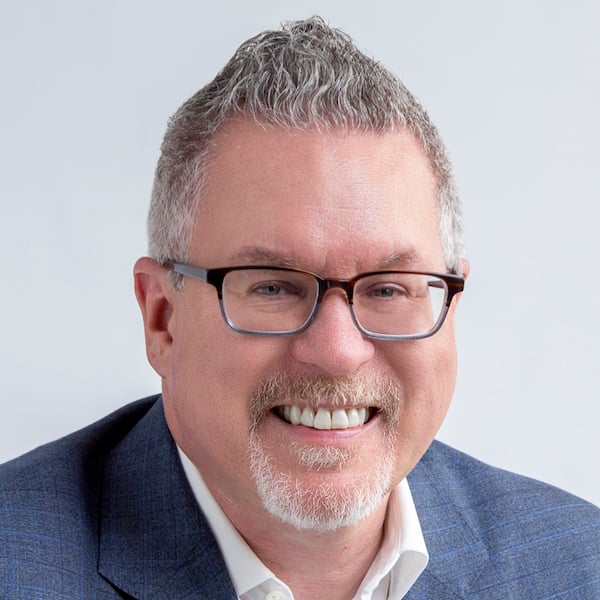
Written by Mark Graban
Mark Graban has served healthcare clients since 2005. Mark is internationally recognized as a leading author and speaker on Lean healthcare. His latest book is "The Mistakes That Make Us: Cultivating a Culture of Learning and Innovation."


Submit a comment